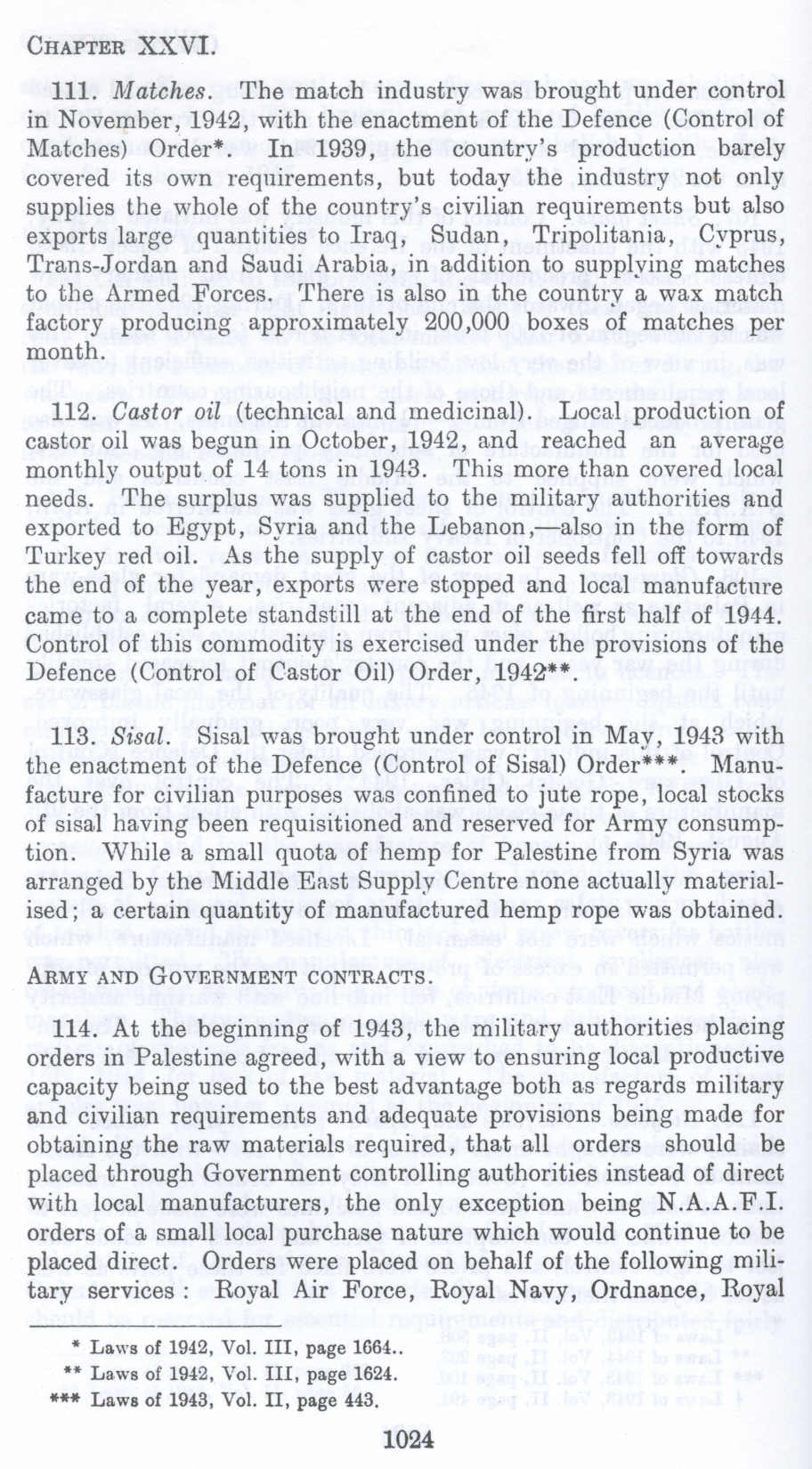| Prev | Next |  |
| Prev | Next |
| PalestineRemembered | About Us | Oral History | العربية | |
| Pictures | Zionist FAQs | Haavara | Maps | |
| Search |
| Camps |
| Districts |
| Acre |
| Baysan |
| Beersheba |
| Bethlehem |
| Gaza |
| Haifa |
| Hebron |
| Jaffa |
| Jericho |
| Jerusalem |
| Jinin |
| Nablus |
| Nazareth |
| Ramallah |
| al-Ramla |
| Safad |
| Tiberias |
| Tulkarm |
| Donate |
| Contact |
| Profile |
| Videos |
British Mandate: A Survey of Palestine: Volume II - Page 1024 |
Disclaimer
The above documents, article, interviews, movies, podcasts, or stories reflects solely the research and opinions of its authors. PalestineRemembered.com makes its best effort to validate its contents.


Post Your Comment
*It should be NOTED that your email address won't be shared, and all communications between members will be routed via the website's mail server.
111. Matches. The match industry was brought under control in November, 1942, with the enactment of the Defence (Control of Matches) Order*. In 1939, the country's production barely covered its own requirements, but today the industry not only supplies the whole of the country's civilian requirements but also exports large quantities to Iraq, Sudan, Tripolitania, Cyprus, Trans-Jordan and Saudi Arabia, in addition to supplying matches to the Armed Forces. There is also in the country a wax match factory producing approximately 200,000 boxes of matches per month.
112. Castor oil (technical and medicinal). Local production of castor oil was begun in October, 1942, and reached an average monthly output of 14 tons in 1943. This more than covered local needs. The surplus was supplied to the military authorities and exported to Egypt, Syria and the Lebanon,-also in the form of Turkey red oil. As the supply of castor oil seeds fell off towards the end of the year, exports were stopped and local manufacture came to a complete standstill at the end of the first half of 1944. Control of this commodity is exercised under the provisions of the Defence (Control of Castor Oil) Order, 1942**.
ll3. Sisal. Sisal was brought under control in May, 1943 with the enactment of the Defence (Control of Sisal) Order***. Manufacture for civilian purposes was confined to jute rope, local stocks of sisal having been requisitioned and reserved for Army consumption. While a small quota of hemp for Palestine from Syria was arranged by the Middle East Supply Centre none actually materialized; a certain quantity of manufactured hemp rope was obtained.
ARMY AND GOVERNMENT CONTRACTS.
114. At the beginning of 1943, the military authorities placing orders in Palestine agreed, with a view to ensuring local productive capacity being used to the best advantage both as regards military and civilian requirements and adequate provisions being made for obtaining the raw materials required, that all orders should be placed through Government controlling authorities instead of direct with local manufacturers, the only exception being N.A.A.F.I. orders of a small local purchase nature which would continue to be placed direct. Orders were placed on behalf of the following military services: Royal Air Force, Royal Navy, Ordnance, Royal
___________________________
* Laws of 1942, Vol. III, page 1664
** Laws of 1942, Vol. III, page 1624.
*** Laws of 1943, Vol. II, page 443.
1024